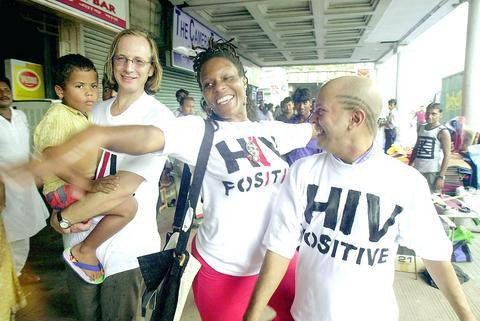Top researchers, policymakers and activists head to Bangkok this week to assess the global AIDS pandemic as the killer disease is poised to ravage Eastern Europe and Asia's most populous countries.
Up to 20,000 people are registered for the conference starting on Sunday, making it the biggest potential turnout for any meeting in the 23-year history of AIDS and the first time this key event will be held in a developing country in Asia.
Ahead of the conference, the UN agency UNAIDS will tomorrow issue its first detailed update on the world epidemic in two years, giving the latest estimated toll of deaths and new infections and country-by-country figures.

PHOTO: AFP
Since it first came to light in 1981, acquired immune deficiency syndrome has left no cranny of the world unscathed.
According to previous estimates, the disease had claimed some 25 million to 26 million lives as of last year, and around 40 million people were living with the disease or the virus that causes it. Around 14,000 more people each day become infected.
There is no cure for HIV, only antiretroviral drugs which keep the virus at bay and which are only just now starting to trickle into poor countries that need them most. And any vaccine to prevent infection seems to lie years away.
Ironically, says UNAIDS Executive Director Peter Piot, the picture is brighter today than it has been in years.
"The landscape of AIDS has changed quite dramatically," he said in a phone interview. "In developing countries, our work has changed, especially in Africa."
The main improvement, he said, is that money is at last starting to flow in big volumes, with funds reaching more than US$5 billion this year alone.
This is still not enough to meet needs, but -- combined with big price cuts for drugs -- it has given a kickstart to the UN's goal of providing three million poor people with antiretroviral therapy by the end of next year.
China, India and Indonesia -- Asia's Big Three, accounting for more than a third of humanity -- are ripe targets for AIDS, as are the former Soviet-bloc countries, experts say.
Each nation is different, but a common thread binds them. The bitter experience of the US, Europe and Africa shows how ignorance, stigma, official indifference and poor resources become a lethal combination, enabling the virus to leap out of small, localized demographic pools and into the population mainstream.
"The handshake of [Chinese] Premier Wen Jiabao (
But, he said, the level of political awareness was not the same in Eastern Europe, facing the fastest-growing HIV spread of any region in the world.
As for India and its neighbors, "the leaders are in a state of denial and there is a very high level of discomfort to even talk about it," Praful Patel, the World Bank's regional vice president, complained last Wednesday. "[They thought] HIV-AIDS is an African problem and it cannot happen in South Asia."

A fire caused by a burst gas pipe yesterday spread to several homes and sent a fireball soaring into the sky outside Malaysia’s largest city, injuring more than 100 people. The towering inferno near a gas station in Putra Heights outside Kuala Lumpur was visible for kilometers and lasted for several hours. It happened during a public holiday as Muslims, who are the majority in Malaysia, celebrate the second day of Eid al-Fitr. National oil company Petronas said the fire started at one of its gas pipelines at 8:10am and the affected pipeline was later isolated. Disaster management officials said shutting the

US Vice President J.D. Vance on Friday accused Denmark of not having done enough to protect Greenland, when he visited the strategically placed and resource-rich Danish territory coveted by US President Donald Trump. Vance made his comment during a trip to the Pituffik Space Base in northwestern Greenland, a visit viewed by Copenhagen and Nuuk as a provocation. “Our message to Denmark is very simple: You have not done a good job by the people of Greenland,” Vance told a news conference. “You have under-invested in the people of Greenland, and you have under-invested in the security architecture of this

Japan unveiled a plan on Thursday to evacuate around 120,000 residents and tourists from its southern islets near Taiwan within six days in the event of an “emergency”. The plan was put together as “the security situation surrounding our nation grows severe” and with an “emergency” in mind, the government’s crisis management office said. Exactly what that emergency might be was left unspecified in the plan but it envisages the evacuation of around 120,000 people in five Japanese islets close to Taiwan. China claims Taiwan as part of its territory and has stepped up military pressure in recent years, including

UNREST: The authorities in Turkey arrested 13 Turkish journalists in five days, deported a BBC correspondent and on Thursday arrested a reporter from Sweden Waving flags and chanting slogans, many hundreds of thousands of anti-government demonstrators on Saturday rallied in Istanbul, Turkey, in defence of democracy after the arrest of Istanbul Mayor Ekrem Imamoglu which sparked Turkey’s worst street unrest in more than a decade. Under a cloudless blue sky, vast crowds gathered in Maltepe on the Asian side of Turkey’s biggest city on the eve of the Eid al-Fitr celebration which started yesterday, marking the end of Ramadan. Ozgur Ozel, chairman of the main opposition Republican People’s Party (CHP), which organized the rally, said there were 2.2 million people in the crowd, but